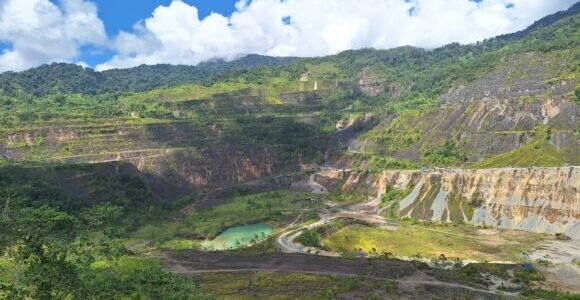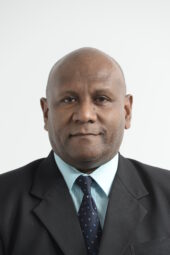The Autonomous Bougainville Government now has majority control of Bougainville Copper Limited (BCL) and the Panguna mine after the Papua New Guinea government formally handed over its share in June. In this interview with Business Advantage PNG, BCL CEO Johnny Auna shares key milestones for the multi-billion dollar redevelopment of the historic copper mine.

Bougainville Copper Limited is working towards the reopening of the historic Panguna mine. Credit: BCL
For the first time, the Autonomous Bougainville Government (ABG) has majority control of Bougainville Copper Ltd (BCL) – and therefore the historic Panguna copper mine – after the Papua New Guinean government formally handed over its 36.45 per cent share in the company.
The long-promised transfer– which brought the ABG share to 72.9 per cent – was formalised in a 26 June ceremony involving PNG Prime Minister James Marape and Bougainville President Ishmael Toroama. The remaining 27.1 per cent is held by public and institutional investors, including through a listing on the Australian Securities Exchange.
For BCL, this latest milestone coincides with work to redevelop what was once one of the world’s largest copper-producing mines. It follows the Bougainville government’s February 2024 approval of BCL’s five-year exploration licence for Panguna, another important milestone, according to BCL Chief Executive Johnny Auna.
“We’ve gone out to the market to try and sign an agreement with a tier-one mining company.”
“The exploration licence dictates our activities,” Auna tells Business Advantage PNG, noting that it included a requirement to get landowner approval to conduct exploration and other early works in the licence area. This was completed in November 2024, he says.
National-building resource
Panguna was operated by BCL, then under majority ownership by Rio Tinto, from 1972 until 1989, when operations were suspended due to militant activity.
In it 17 years of operation, the mine produced 3 million tonnes of copper, 306 tonnes of gold and 784 tonnes of silver. Its earnings amounted to K5.2 billion, representing approximately 44 per cent of PNG’s exports and helping to fund the newly independent country. Now, with Bougainville targeting independence in 2027 (pending ratification by the Papua New Guinean Parliament), Panguna is being viewed once again as crucial to nation-building.

BCL’s Johnny Auna. Credit: BCL
“A lot of people recognise that to be really independent, you need a big economic project – and Panguna offers that,” Auna says.
“Based on the resource, we’re looking at a lifespan of around 20 years, but we’re confident and optimistic that there’s a lot more upside adjacent to our license, which is where we have the resource mapped, as well as down in depth within the existing pit.”
Potential partners
As a project requiring a multi-billion dollar capital expenditure to reopen the mine, BCL has hired Australian firm Grant Samuel as financial advisor and has begun talking to potential joint venture partners from around the world.
“If you look at our balance sheet, we don’t really have the funds ourselves to redevelop the project, which is why we’ve gone out to the market to try and sign an agreement with a tier-one mining company, both to help us with the equity as well as the technical knowhow and the mining experience,” Auna says.
International development and export banks have also shown an interest in providing finance, Auna adds.
Despite its potential, Auna acknowledges the potential complexity involved with reopening Panguna. For example, although Bougainville has its own Mining Act, many supporting regulations – including environmental legislation – remain under PNG jurisdiction.
“That’s going to be a challenge for companies trying to understand how they can manage those risks,” Auna says.
Economic catalyst
While BCL remains officially neutral on Bougainville’s political status, Auna is clear about the project’s importance.
He notes that with a Bougainvillean CEO, four Bougainvillean directors, and 90 per cent Bougainvillean employees, the company’s connection to the region is deep.
“With independence or without independence, Bougainville needs the economy to be vibrant and growing,” he says. “This project provides assistance in kickstarting that process.”
Sadly, Mr. Johnny Auna passed away suddenly on August 11, according to an announcement by Bougainville Copper Limited. Business Advantage PNG sends its deepest condolences to Mr Auna’s family and to his colleagues at BCL.








Speak Your Mind